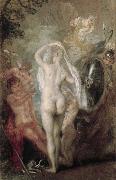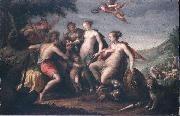Wholesale Oil Painting Reproductions No Minimum and Door to Door! |
|||||||||||
|
|
|||||||||||

|
|||||||||||
|
|
|
||||||||
All Jean-Antoine Watteau Oil Paintings |
||||||||
|
|
||||||||
|
|
||||||||
|
Artist Introduction: 1684-1721
Antoine Watteau Art Locations
He is best known for his invention of a new genre, the fete galante, a small easel painting in which elegant people are depicted in conversation or music-making in a secluded parkland setting (see under FETE CHAMPETRE). His particular originality lies in the generally restrained nature of the amorous exchanges of his characters, which are conveyed as much by glance as by gesture, and in his mingling of figures in contemporary dress with others in theatrical costume, thus blurring references to both time and place.
Watteau work was widely collected during his lifetime and influenced a number of other painters in the decades following his death, especially in France and England. His drawings were particularly admired. Documented facts about Watteau life are notoriously few, though several friends wrote about him after his death (see Champion). Of over two hundred paintings generally accepted as his work |
||||||||
|
|
||||||||
|
le jugement de paris Painting ID:: 57269 |
mk255 for in the years 1718-1721. 0.47 x 0.21 meters canvas. Paris, the Louvre |
|||||||
Height Width |
INS/CM Quality |
|||||||
|
X |
| |||||||
|
|
||||||||
All Hans von Aachen Oil Paintings |
||||||||
|
|
||||||||
|
|
||||||||
|
Artist Introduction: was a German mannerist painter.
His name is derived from the birth place of his father, Aachen in Germany. Other variations of the name include Johann von - and - von Achen and various concisions like Janachen, Fanachen, Abak, Jean Dac, Aquano, van Aken etc.
Hans von Aachen began painting in Germany as a pupil of the Flemish master E. Jerrigh. He then moved to Italy in 1574 to study further. He toured Rome and Florence, but eventually settled in Venice. He initially became a pupil of Kaspar Rems, but soon decided to develop his own mannerist technique, by studying Tintoretto and Michelangelo's followers. However, during all of his life he was influenced by the style of Bartholomeus Spranger and Hendrick Goltzius who dominated the art scene in Germany at the time.
He returned to Germany in 1588 where he became well known as a painter of portraits for noble houses. He painted several works for Duke William V of Bavaria. He married Regina, the daughter of the composer Orlando di Lasso in Munich. In Munich he came into contact with the Imperial Court in Prague. In 1592 he was appointed official painter of Rudolph II, Holy Roman Emperor. However, Von Aachen only moved to Prague in 1601, where he stayed painting commissions from Emperor Rudolph II, and later from Matthias I.
Amongst van Aachens pupils were Peter Isaak and Joseph Heinz. His works have been copied by Wolfgang Kilian, Dominicus Custos and Jan Sadeler.
|
||||||||
|
|
||||||||
|
|
Le jugement de Paris Painting ID:: 72514 |
Date 1588(1588)
Medium Oil on canvas
Dimensions 87.5 X 133 cm (34.45 X 52.36 in)
cyf |
||||||
Height Width |
INS/CM Quality |
|||||||
|
X |
| |||||||
|
|
||||||||
|
Prev Next
|
||||||||
|
|
||||||||
|
Related Paintings to Hans von Aachen :. |
||||||||
|
|
||||||||
|
CONTACT US |


